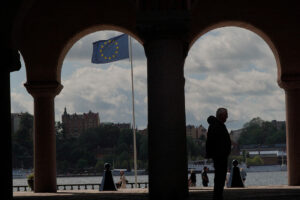
PHL may face challenges in FTA talks with EU, analysts say
By Justine Irish D. Tabile, Reporter
THE EUROPEAN Union’s (EU) strict standards on labor, human rights and the environment may prove to be sticking points in the Philippines’ negotiations for a free trade agreement (FTA), according to analysts.
Leonardo A. Lanzona, Jr., economics professor at Ateneo de Manila University, said in an e-mail that although the FTA will help open a lot of markets for the Philippines, the government must first address issues that are of concern to the EU.
“One of the long-standing EU concerns is the creation of decent conditions in the labor market and to institute labor rights,” Mr. Lanzona said in an e-mail.
On Monday, the EU and the Philippines announced the resumption of FTA negotiations in Brussels, Belgium. This comes seven years after FTA talks were stalled due to the trade bloc’s concerns over human rights violations under the administration of then-President Rodrigo R. Duterte.
Mr. Lanzona said the EU will not trade with countries “that take undue advantage of low-paid workers employed under poor and indecent conditions.”
“EU partnerships are contingent on various conditions that need to be resolved internally. These conditions are well known, and yet the government insists on obtaining concessions that the EU is not willing to offer,” he added.
In his speech on Monday, European Commission Executive Vice-President Valdis Dombrovskis welcomed the Philippines’ progress on some specific issues, such as the move towards prevention and rehabilitation in its fight against drugs and the progress on the cases against Rappler founder Maria A. Ressa and former Senator Leila M. de Lima.
“Of course, we look forward to the full resolution of their cases, in line with the highest standards of due process and human rights,” he said.
He noted the EU is the Philippines’ fourth-largest trading partner with trade in goods worth 18.4 billion euros in 2022, and trade in services worth 4.7 billion euros in 2021.
“The FTA is projected to increase trade by up to six billion euros,” Mr. Dombrovskis said.
Trade Secretary Alfredo E. Pascual also said on Monday that the Philippines is aiming for a “balanced, and comprehensive” trade deal with the EU.
Foundation for Economic Freedom President Calixto V. Chikiamco said it is about time that the Philippines pursues an FTA with the EU, as its privileges under the Generalised Scheme of Preferences Plus (GSP+) may be phased out soon.
“It’s a good move to forge an FTA with the EU. Our GSP+ privileges may be phased out as soon as the country graduates into middle-income status,” Mr. Chikiamco said in a Viber message.
The Philippines participates in the EU’s GSP+, which is a special incentive arrangement for low and lower middle-income countries. It charges zero duty on 6,274 Philippine-made products.
Under the current scheme, eligible countries, such as the Philippines, will have to sign on to 27 international conventions on human rights, labor rights, climate action, and good governance.
“An FTA will enable our industries to have duty-free access to the big EU market. We could attract investors to put up factories here to access the EU market,” Mr. Chikiamco said.
Rizal Commercial Banking Corp. Chief Economist Michael L. Ricafort said in a Viber message the Philippines has partially addressed some issues, particularly on human rights.
However, he said that the country may find it challenging to comply with the “additional requirements that may be set by the EU, similar in the past, and to get the approval needed from the many countries comprising the EU.”
Mr. Ricafort noted the FTA could result in more imports from the EU, which would lead to lower import prices and greater competition.
“Among major trading partners, the EU-Philippines FTA and the US-Philippines FTA are the remaining missing FTAs from a competitiveness perspective for both Philippine exports and imports with the EU and US.”
Mr. Ricafort said a free trade deal with the EU would also help the Philippines diversify its export markets.
Meanwhile, the European Chamber of Commerce of the Philippines (ECCP) said the resumption of FTA negotiations is a significant milestone in bilateral economic relations.
“This renewed interest underscores the attractiveness of the Philippines as a prime business destination for European firms, emphasizing the mutual benefits of fostering deeper economic ties,” the ECCP said in a statement.
The ECCP said that the FTA will allow the country to access highly protected sectors in the EU, such as agriculture and garments.
“Critical raw materials, digital trade, and energy sectors are also among those expected to benefit from the FTA,” it added.
In a separate statement, the German-Philippine Chamber of Commerce and Industry, Inc. said that a free trade deal “presents a significant opportunity to further enhance the interests of German businesses.”
In the AHK World Business Outlook Survey for Fall last year, 70% of the German businesses doing business in the Philippines said that an EU-Philippine FTA will have a vital contribution to the success of their business operations.
“GPCCI remains supportive of initiatives that promote a thriving business environment between Germany and the Philippines and is optimistic about the future of EU-Philippines trade relations,” it said.



